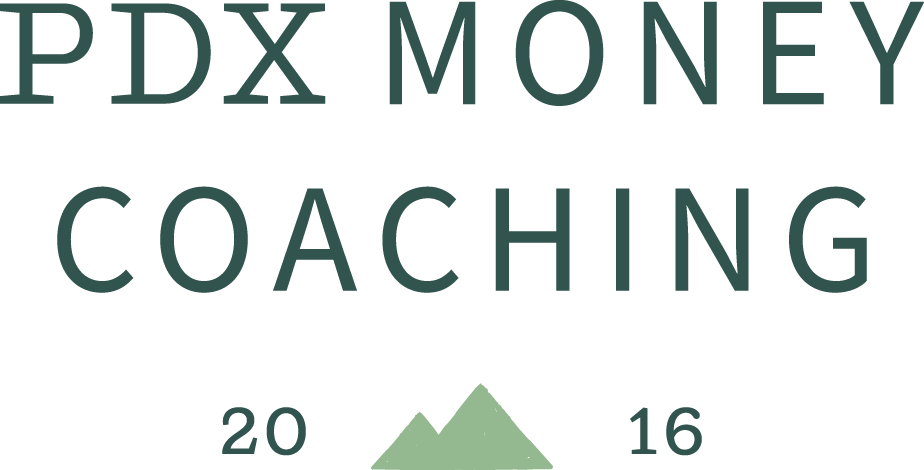
Frequently Asked Questions
About Financial Coaching
Q. I’m excited to get started! Do I need to schedule a call with you before signing up for the Financial Clarity Intensive?
Nope! Anyone is welcome to schedule their Financial Clarity Intensive without chatting with me first, and most people I talk to are a great fit unless they are specifically seeking investment advice (see my FAQ’s below about the difference between a coach and an advisor). If you’re not sure yet whether you are interested in a 3-month program, that’s OK- we can always chat about that either on the call or at the end of your Intensive.
Q. What is an Accredited Financial Coach or Money Coach?
A financial or money coach helps you clarify and specify your goals, and then cheerleads you to accomplishing them. I am here to both help you navigate your relationship with money as well as educate you on financial decisions regarding debt repayment, saving for short and long-term goals, cash-flow, your job benefits, home-buying and more.
Those struggling with or feeling lost about money might first need someone to take a birds-eye-view of their life and help them identify their blind spots in money management. As we work together, clients go deeper into goal setting and planning for the future, until you have a comprehensive understanding of not only your current financial life but how you can take action now to support your older self.
Q. Do you work with people on their money-mindset?
Financial coaching inevitably refreshes your relationship with money. We’ve been carrying our money stories for a long time, and often the underlying beliefs we have about finances are what ultimately need to shift for us to have long term success. The habits you will build during coaching will reinforce a new, different, and more positive relationship with money that will help you move beyond the boundaries or limiting beliefs you’ve had in the past.
When I first begin working with someone who is ready to transform their financial life, we always start with gaining total transparency through the Intensive. During the 3-month program we first focus on streamlining finances and managing your actual cash-flow, so that you know exactly where your money is going at all times and have a tool for making confident financial decisions. Once we know where your money is going, it is easier to take a birds-eye-view on what is happening and discuss any limiting beliefs or practices that may be holding you back from whatever you really want in life.
Q. When is a good time to come for my partner and I to come in for financial counseling?
If you and your partner share some, or all, of your money, it's a great time to get clear on your financial agreements and relationship with spending. The process of setting goals with your combined future in mind, and agreeing on the steps you'll take to get there, will make your relationship stronger.
Whether your goals are to travel, save more for retirement, increase your charitable donations or better manage your home budget with four children, I can help you streamline and take the stress out of financial conversations. If your relationship is on the new side, by bringing all your information to the table and facing your financial picture head-on, you will release any shame you might have been carrying and avoid potential arguments in the future.
Q. Money is REALLY Scary for me… as in, I generally avoid looking at my accounts or even my mail. Am I ready for your coaching?
Most people experience varying levels of shame and anxiety around their finances. Though I am a certified financial counselor, and I am more than comfortable holding space to talk about your relationship with money - a large part of the work I do with people involves facing their real numbers head on. If you know you are ready to look at your financial situation and talk about your future through that lens, I am happy to be your guide.
However, if you have experienced financial trauma- whether it’s from something large like bankruptcy or divorce, or simply from growing up without much of it- and that results in such strong avoidance that you may not be ready or able to dive into your current income and expenses, you may want to start with therapy. Odds are, uncovering some of your deeper beliefs about money will help you be able to look at your finances with more curiosity, and separate your current situation from your past. Some therapists I know who are comfortable doing this work and are taking new clients are:
Magda Permut (In-network with Pacific Source)
Q. I don't know if I can afford financial coaching or if it makes sense for me to pay for it based on my income/debt. What should I do?
The quick answer to this question would be that I will help you save much more money in the long run (or even short run!) than financial coaching will cost you. Most coaches respond to this question by asking you, 'can you afford NOT to get financial counseling?' If paying your bills or how you share finances is causing you to lose sleep at night, I would love to help you make a plan and have more peace of mind.
However, if your income is below the poverty line and you aren't even earning enough to pay for your basic needs, I suggest utilizing some of the amazing free financial resources on my resource page. You can get free coaching, help with your credit, and even credit-building loans no matter what your score may be. I volunteer with both Innovative Changes and ARPDX, both of which offer free financial advice nights and Q&A's.
At minimum I recommend you start tracking every penny you make and spend now, whether that’s with pen and paper, an excel sheet, or a free app through your bank. So much progress is made simply by gaining clarity about what’s happening.
Q. I’m just starting my business and only work for myself part-time; is this a good time to get coaching?
It’s always an awesome time to get on top of your finances. If you are just starting out as a therapist, naturopath, web designer, etc, you may have some work that pays you as an employee, some jobs that give you a 1099, and some private clients. As long as you get a 1099, you are in essence the sole proprietor of a business as far as the IRS is concerned. This is the perfect time to create a business budget, separate your accounts, track your expenses and be ready for tax time.
In the process of creating both a personal and business spending plan, you will learn what the expenses are related to being a business owner — and be ready to write them off.
Q. What’s the difference between a financial coach and a financial planner or advisor?
Certified Financial Planners, Financial Advisors, or Investment Advisors sometimes charge a fee for managing your investments and/or sell you services related to protecting your wealth, such as insurance. However, a Fee-Only Advisor usually offers you a comprehensive retirement and insurance plan for a set cost.
A financial coach works with you to confidently manage your money and educates you on topics related to it that you have questions about — from understanding your pay stub to calculating the impacts of refinancing your home. Our scope of practice is limited in that we cannot recommend specific investment funds or securities.
Q. Can you give me advice on investing?
I am here to help you confidently manage the money you make and determine how much you can safely invest. I can educate you on what options are out there for savings vehicles and the tax benefits of contributing to them, for example.
I am not a financial advisor or financial planner, so I don't sell any products or manage investments, though I can give you resources & referrals for that. Many clients in Portland ask about Socially Responsible Investing and I am happy to connect you to advisors or brokers who offer that.
Q. How long does your typical client work with you?
Most clients who take my intensive end up wanting to go through our 3-month program in order to learn a new way to actually manage their money in real time. Many of those clients continue to meet with me regularly (once or twice per month) for six months to a year, and then may schedule ad-hoc sessions with me when needed. These check-ins are sometimes used to re-craft their budget (or ‘spending plan’) based on what’s actually been happening financially, or perhaps create a drastically different plan due to a move, new job, divorce, etc.
I have a number of clients that I’ve been meeting with for over 5-6 years. Because I know them so well, and they have a solid system to managing their money, we can tackle many strategic questions together during a 1-hour session.
Q. Can you help people who are interested in Financial Independence or early retirement?
I love supporting clients who are interested in retiring early, or perhaps just leaving their 9-5 to pursue work in a different way. I help clients confidently manage their money and feel clear about how much they really need to live on to feel satisfied and fulfilled. It then becomes clear how much someone can safely invest given the commitments and lifestyle they currently have.
One of the benefits of receiving Financial Coaching is inevitably becoming more in tune with what actually makes you happy, which is very useful for those considering an early retirement.
If you are interested in knowing what your ‘FI number’ is, (how much you would need to have saved in order to stop working), I can help you craft a desired ‘retired life’ budget that is as realistic as possible to base those calculations on.
Let’s start your journey to financial freedom
